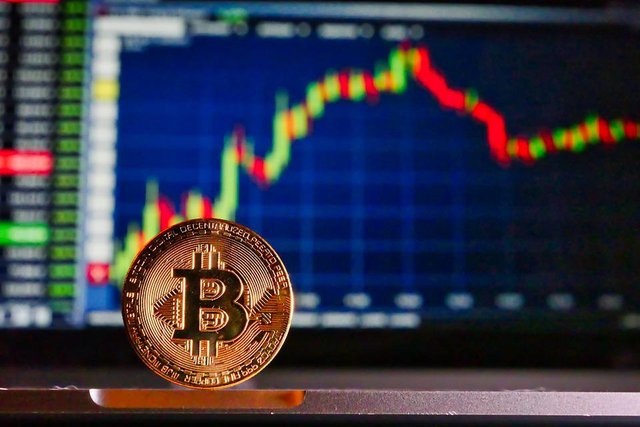
Copyright-free Image source: Pixabay
What Impact Do Cryptocurrencies Have on the Global Market?
Is bitcoin a safe-haven asset or an asset bubble?
Cryptocurrencies have grown in popularity as a result of the decentralization ideas they
promote, as well as the possibility for large returns, but their volatility remains strong, and
these assets have a higher risk of loss than many traditional assets. In 2017, for example,
Bitcoin values soared from roughly $1,000 to over $19,000 before falling to around $3,000. 1
Then, until the end of 2020, Bitcoin climbed again, reaching new highs of approximately
$60,000 before plummeting below $30,000 in the summer of 2021.
Cryptocurrencies have grown in popularity due to the potential for massive gains, but there
volatility also carries the danger of significant losses.
Cryptocurrencies are a digital alternative to fiat money that is simple to use.
Because of the market's noncorrelated nature, cryptocurrencies, like precious metals like
gold, can be used as a risk hedge.
Cryptocurrencies: An Introduction
Cryptocurrency is a type of digital or virtual currency that can be used as a form of
payment. Cryptography is used by cryptocurrencies to safeguard and verify transactions as
well as create new currency units, hence the "crypto" prefix (coins). Cryptography allows you
to encode anything that is easy to decipher with a key but impossible to decipher without
one, which means coins are complex to make but transactions are simple to verify.
Cryptocurrencies are, at their foundation, entries in an immutable, pseudo-anonymous
database is known as a "blockchain" that no one can alter (except under extreme
circumstances when direct edits are made). Counterfeiting currencies is exceedingly difficult
or impossible due to the blockchain, which is a public record that is checked by many distinct
nodes. It also makes tracing specific transactions between anonymous user accounts or
wallets easier.
Appeal to the Whole World
Cryptocurrencies are a digital alternative to fiat money that is simple to use. Although
consumers in the United States and the European Union may consider cryptocurrencies to
be a novelty, many countries have mismanaged indigenous currencies. Venezuela's
autocratic administration, for example, has become known for its galloping inflation, which
has resulted in deteriorating living conditions for millions of inhabitants who lack access to
foreign currency. or even wallets.
The enormous fluctuations in Bitcoin and other cryptocurrencies may appear risky to
American customers, but Venezuelans may find the swings tolerable given that their
the domestic currency has been in steep decline for several years and shows no signs of
abating. In other words, because the quantity of cryptocurrency coins in circulation is
mathematically restricted over time, many worldwide consumers may consider
cryptocurrencies as a hedge against inflation.
Other governments impose severe capital controls and/or levy substantial taxes to regulate
the movement of money.
Cryptocurrencies can be used to avoid capital controls and taxes, whether legal or not,
resulting in increasing demand from consumers and enterprises. As a result, many countries
have begun to crack down on the illicit use of cryptocurrencies for tax evasion, as well as
illegal purchases and transactions in other countries.
Responses from the government
Across central banks and financial institutions, the official response to cryptocurrencies has
been lukewarm at best. While some organizations have been supportive of them, given the
market's tremendous volatility, many central banks remain hesitant. Tax evasion and capital
restrictions issues have also sparked significant concern.
United States Federal Reserve: Chairman Jerome Powell of the United States Federal
Reserve feels that technological challenges exist and that governance and risk
management will be critical before cryptocurrencies become mainstream.
Former European Central Bank Vice President Vitor Constancio referred to Bitcoin as a
"tulip" in reference to the 17th-century Dutch bubble, and many other governors have
expressed similar reservations.
The People's Bank of China believes that the time is "ripe" to welcome cryptocurrencies,
but the central bank wants complete control, and officials are cracking down on the country's
cryptocurrency sector.
Bank of Japan: The Bank of Japan does not believe that cryptocurrencies have a market.
Former Bank of England Governor Mark Carney declared cryptocurrencies a "revolution" in
banking, making the central bank one of the few governments to support the technology.
Faced with its own funding constraints, the Venezuelan government developed its own
cryptocurrency, the "petro," in 2018, which is reportedly backed by crude oil barrels. While
official sources claim that the government raised billions of cash, many analysts doubt these
statistics, and the United States has banned Americans from acquiring cryptocurrencies.
The petro is still fighting to become a fully functional currency in 2020.
Effect on International Investments
Cryptocurrencies have many advantages in terms of frictionless transactions and inflation
control, but many investors are adding them to their varied portfolios as assets. The market's
noncorrelated character, in particular, makes cryptocurrencies, like precious metals like
gold, a viable risk hedge. For this reason, many cryptocurrency exchange-traded
instruments (ETFs and ETNs) have emerged.
Some analysts, on the other hand, believe that a cryptocurrency fall will have a negative
influence on the overall market, similar to how mortgage-backed securities started the global
financial crisis. It's worth noting that the overall market value of all cryptocurrencies is
currently between one and two trillion dollars, which is still less than the market capitalization
of some huge public corporations like Meta (previously Facebook) or Amazon. 2
Cryptocurrencies, on the other hand, are a new and volatile asset class that can go in either
direction. Finally, while many investors see cryptocurrencies as a vehicle for speculation or a
hedge against inflation, the market's magnitude does not pose a systemic concern as of
Your post was upvoted and resteemed on @crypto.defrag
Downvoting a post can decrease pending rewards and make it less visible. Common reasons:
Submit